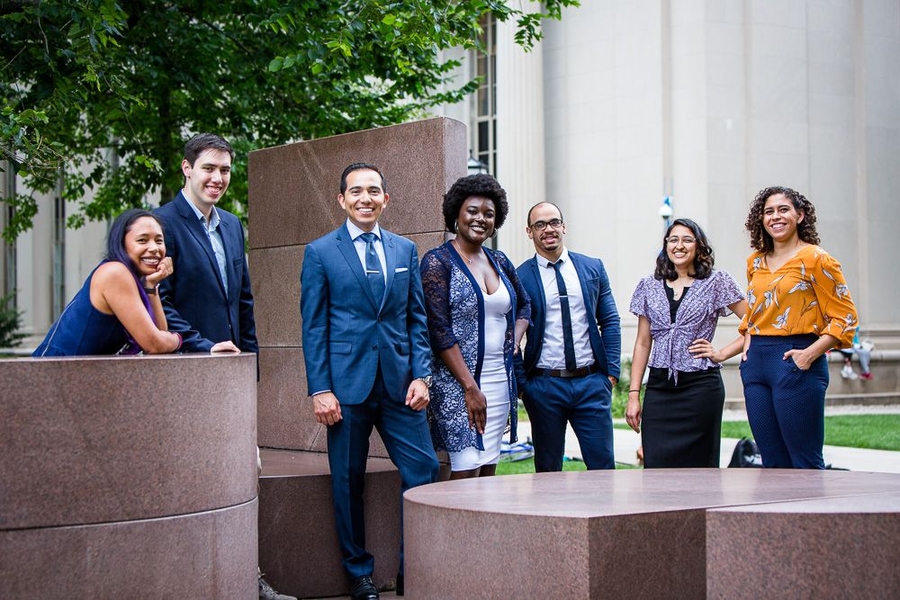
Left to right: Andrea Wallace, Sebastian Pineda, Josué Lopez, Ifueko Igbinedion, Jean Carlos Serrano Flores, Zoe Lemon, and Fiona Grant
For the past seven years, the MIT University Center for Exemplary Mentoring has created a robust infrastructure of resources, people, and support.
Kate Petersen | School of Engineering
The MIT University Center for Exemplary Mentoring (UCEM) was founded in 2015 with an Alfred P. Sloan Foundation grant that centers on the recruitment, retention, and academic success of underrepresented doctoral students of color in five areas within the School of Engineering: the departments of Biological Engineering, Chemical Engineering, Electrical Engineering and Computer Science (EECS), and Mechanical Engineering, and the Harvard-MIT Program in Health Sciences and Technology (HST). The MIT Institute for Medical Engineering and Science (IMES) is HST's home at MIT.
Promising PhD candidates are recruited for the UCEM program, and once enrolled receive financial support, mentorship, and professional development training as well as access to a broad and diverse professional network.
UCEM engages candidates through the entire process of “thinking about a PhD, getting in and doing a PhD, and then exiting the PhD,” says Leslie Kolodziejski, UCEM principal investigator and professor of electrical engineering in the Department of Electrical Engineering and Computer Science (EECS). Over the life of UCEM thus far, 83 scholars have been supported, with 58 scholars currently in the program.
A valued space at MIT
UCEM Scholar Jean Carlos Serrano Flores SM ’18 PhD ’21, a graduate of the Department of Mechanical Engineering, remembers first encountering UCEM at an MIT event before he had formally accepted his offer of admission.
“I had two students from [UCEM] directly talk to me prior to my decision,” Serrano Flores says. “UCEM made me feel much more secure that I was going someplace where I’d be welcome … and supported.”
Danielle Olson ’14, SM ’19, PhD ’21, also a UCEM scholar and a graduate of EECS, names the UCEM funding as being an important part of her choice to attend MIT. She also said that she’s appreciated the flexibility of the funding, which can be used to attend conferences and for research expenses that aren’t covered under lab funding.
But both Olson and Serrano Flores emphasize the value of the community and mentorship elements of the UCEM program. UCEM scholars get to know each other through seminars, one-on-one mentoring, conferences, and other UCEM events, such as regular scholar lunches and social activities.
Serrano Flores describes seminars ranging from developing different aspects of a scholar’s academic career to navigating interpersonal relationships with advisors and peers to managing racial biases that graduate students of color experience in academia.
“We're all from underrepresented backgrounds,” says Serrano Flores. “Being in a room with everybody that knows the experiences that you would go [through] along the way, and how tricky it is to really manage them in today's world, was really good.”
Olson feels similarly.
“I felt certainly firsthand in my first several years of graduate school that it's really easy to feel like you could fall between the cracks if you don't have support in place,” she says.
Olson says she was able to access one-on-one support through UCEM, in addition to finding space to talk about common challenges such as “imposter syndrome.”
“I wouldn't necessarily go to a network event in my community of research to talk about those things,” she says. “But [at UCEM] you have these spaces where you can not only have honest conversations … but also get strategies for addressing those things.”
Bianca Lepe is a fourth-year PhD candidate in the Department of Biological Engineering, a UCEM scholar, and the Graduate Student Council’s diversity, equity, and inclusion chair. She says that the networking opportunities at UCEM helped her get the “lay of the land,” so that she could more effectively participate in addressing academic racism at MIT.
“I am on the steering committee for the Strategic Action Plan that's being created around diversity, equity, and inclusion,” Lepe says. “A lot of the conversations and lived experiences that I've had [with] my fellow UCEM scholars has been really helpful in creating the priorities … under the official MIT strategic plan.”
Increasing representation in academia
In accordance with the Sloan Foundation objective to increase representation in academic faculty positions, Kolodziejski says that UCEM scholars attend the Institute on Teaching and Mentoring conference twice during their tenure at MIT. The conference is a three-day crash course in the fundamentals of being a professor, and covers topics ranging from mentoring students to writing proposals to presenting scholarship and giving presentations for employment.
Kolodziejski says that participation in this conference can be very clarifying for students, and for those who want to pursue an academic path, it helps outfit them with the tools they need upon graduating. However, Kolodziejski makes it clear that UCEM scholars are under no obligation to take an academic path.
For more information about UCEM, or if you are interested in becoming a UCEM scholar, please visit the UCEM website.
* Originally published in MIT News.